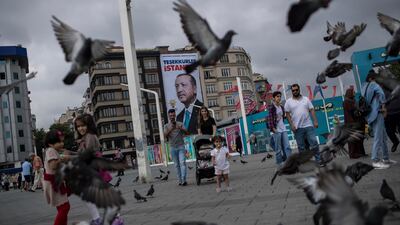In the early hours of Monday morning, President Recep Tayipp Erdogan took to the balcony of his party’s headquarters in Ankara to address thousands of supporters, declaring democracy the winner in an election that was "an example for the rest of the world."
And what an example it was – with allegations of vote fraud, reports of a gun fight, 14 people arrested for interfering with results, and a result apparently called three days earlier in an accidental TV broadcast. An army of volunteer observers were brought in by the opposition in a bid to curtail the inevitable tampering with ballot boxes, and yet many were intimidated and even attacked.
The farce didn’t end once the polls closed, either – with the state run news agency the only media allowed to report the results as they unfolded, they gave Mr Erdogan a clear early lead. However, with an independent monitor and the high electoral board disputing many of the figures, confusion reigned.
Eventually, Mr Erdogan went on TV to declare himself the victor according to "unofficial results”, while, simultaneously, the opposition were announcing he'd failed to secure a majority in the presidental vote, which would result in a runoff election. His most credible challenger, Muharrem Ince, then supposedly conceded via WhatsApp, with his supporters hitting social media to condemned the "worst break-up text ever."
If this was a lesson to the world on democratic elections, then it was one on how not to run one.
And when congratulations began to pour in for the president for his election as the new president, some long before there were any conclusive results, it was hard not to judge the man by the company he keeps. Among the early callers were the emir of Qatar and Hungary’s Prime Minister Victor Orban, a man who boasts that his country has become an “illiberal democracy”.
It was a tense and emotional day, but for many the hardest part was knowing that the results could have been different if the elections had been fought on a free and fair playing field. As condemned in a report from the Organization for Security and Co-operation in Europe, the opposition had their fundamental freedoms restricted. They were up against the manipulation of voting district boundaries, an aggressive campaign of disinformation and deliberate rousing of nationalist fervour through military campaigns. They were not allowed to campaign freely and barely appeared in the Turkish media, which is largely now loyal to the state.
There was little democratic about this election, and it was strongly brought into focus by the fact that the one-time leader of the country’s Kurdish-focused political party, Selahattin Demirtas, was forced to run for president from his prison cell after he was arrested 20 months ago.
He and many of the more than 140,000 people who have been detained since a state of emergency was imposed following a failed coup in 2016 would have been watching the results unfold nervously. The state of emergency has allowed Mr Erdogan to effectively rule by decree, and that is something that has now been cemented as part of his sweeping new powers.
It does not look good for those who fall short of his rule now that he is head of state under the new system. In the short time since the election, there have already been more detentions of those accused of supporting the cleric the government hold responsible for the coup.
And for people like Taner Kilic, a human rights lawyer and the Chair of Amnesty International in Turkey, the country they woke up to on Monday morning would have looked the same, but different. He has been held on terror charges for over a year, with a court ruling that his pre-trial detention be continued just three days before the election, despite there apparently being no evidence against him.
And Zehra Dogan, who is serving more than two years in prison for a painting that showed the destruction caused by Turkish security forces in the Kurdish-majority south east. She was one of the founders of Turkey’s first women’s news agency and was honoured with a Courage in Journalism Awards last week.
The outlook looks bleak for those who have dared to stand against the president, and those who do in the future. If the recent elections represent the pinnacle of Turkish democracy, then representative government in Turkey is in a sorry state indeed.
Liz Cookman is The National's assistant national editor


